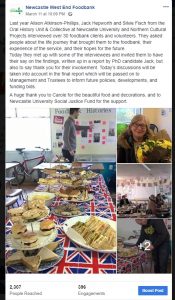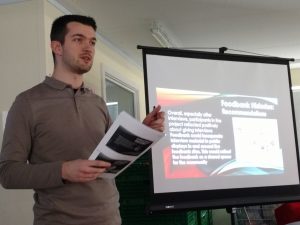Foodbank Histories is a collaborative project between Newcastle West End Foodbank, Northern Cultural Projects, and Newcastle University Oral History Unit & Collective. The project began in 2018, recording approximately 30 short oral history interviews with foodbank clients, volunteers, and supporters. Over the past five weeks, PhD candidate Jack Hepworth has completed a short-term placement on Foodbank Histories, funded by the Newcastle University Social Justice Fund. Here he reflects on his experience.
 Having volunteered with Foodbank Histories during the previous eight months with my colleagues Alison Atkinson-Phillips (Oral History Unit) and Silvie Fisch (Northern Cultural Projects), I arrived with a working knowledge of the project, but the last five weeks have taught me a lot.
Having volunteered with Foodbank Histories during the previous eight months with my colleagues Alison Atkinson-Phillips (Oral History Unit) and Silvie Fisch (Northern Cultural Projects), I arrived with a working knowledge of the project, but the last five weeks have taught me a lot.
When my placement began at the start of February, I spoke with Alison and Silvie and collectively we outlined our objectives. I would:
- transcribe approximately 500 minutes of interview
- design copyright and re-use agreements, enabling licensed interview material to contribute to future research
- liaise with interviewees, sending transcripts and inviting them to assign copyright
- analyse the interview material, with a view to making recommendations for the Newcastle West End Foodbank
- co-present initial findings at a workshop, where interviewees could offer feedback
- write this blog post.

Jack Hepworth presenting Foodbank Histories findings back to interviewees.
I arrived at the placement mindful that I had spent the previous thirty months immersed in the very personal business of doctoral study: accountable chiefly to myself, setting my own deadlines, research parameters, and objectives. I was anxious to ensure that my placement represented ‘value’ for all project partners. To this end, I thought about some aims for personal development. I wanted to learn from the experience of working in a team, to show initiative while fulfilling accountability to a range of partners. Having conducted oral histories in earlier research, I also wanted to develop my post-interview skills, liaising with participants.
Throughout the placement I made plenty of mistakes which reinforced my need to improve certain skills. These errors included basic IT hitches and minor oversights. Additionally, just two days in, a communication breakdown and poor time-management on my part jeopardised an important meeting. I learned the lesson quickly. Since then, in terms of accountability and working within a team, I’ve been reminded of the importance of initiative, clarity in communication, and tackling tasks as early as possible.
Reflecting on the placement, I feel overwhelmingly positive. At a personal level, it has been a refreshing change from a PhD project which I have enjoyed enormously, but which had necessarily dominated my thoughts and routine since September 2016. I enjoyed the interpersonal aspect of much of the work: working in a team, liaising with project partners, meeting interviewees and talking to them on the phone. Designing the copyright and re-use agreements took me into personally uncharted terrains of legalese. I fulfilled all of the placement’s initial aims, and have also been able to draft a final report.
Distilling detail from the project’s bigger picture for each individual conversation, whether with foodbank clients, volunteers, supporters, or the CEO, benefited my communication skills. As the weeks progressed, my confidence grew and I got better at taking responsibility, working quickly and, I hope, effectively towards the objectives.
As anybody with experience can attest, transcribing almost nine hours of interviews was, at times, laborious. Because of the subject matter, the process was also, by turns, saddening, disturbing, and downright infuriating.
The placement has developed my skills, but also prompted me to reflect more broadly on how academia, partnership work, and historical and social justice interact. There is enormous potential for mutual benefit from this work, although there are provisos to keep in mind.
From Alison and Silvie, I learned the degree of patience and groundwork required to establish trust, build relationships, and evolve initiatives. I learned the importance of speculating on ideas in partnership work, mindful that the majority will wither on the vine, while a minority will materialise into something lasting. I learned the value of striving towards shared authority in partnership work – even if, at the outset, it might feel that you are foisting ideas on other partners! Provided channels of communication are open and honest, the potential for mutual benefits remain.
I would like to think that Foodbank Histories has a future, and has legacies which will continually benefit the West End Foodbank and everybody connected to it. It has been a privilege to be involved.
